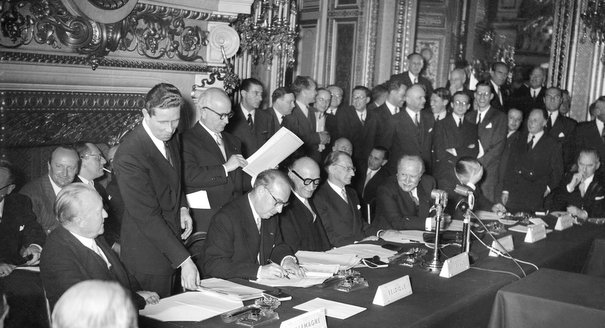The older among us will remember the summers where real issues could take a summer break, to be replaced by the so called “Sommer Loch”, or silly season, themes which closed the news gap until the summer vacation was over. That was certainly not the case this summer, where neither the Syrian crisis nor the euro crisis took a summer break. Although markedly different from one another, both these crises currently seem similarly irresolvable, or almost. I say almost, because they could be resolved, but, the price to be paid is such that none of the relevant players currently has the will or ability to pay it.
In the case of Syria, it’s not a matter of if Bashar al-Assad will stay in power, but of when and under what circumstances he will depart. The same goes for the eurozone. It is not a question of whether the eurozone in its current composition will overcome the current crisis, but when it will disintegrate. The financial instruments that were and are in the process of being put in place might help to temporarily alleviate the single currency’s problems, but they will certainly not resolve them. The eurozone crisis is only a symptom of a series of political, economic, financial, and structural problems that have been accumulating over the last decades.
Unresolved questions with respect to the future of the EU, half-baked decisions, or none at all, and improvisation have all left their imprint on the union. The unresolved strategic question of enlargement vs. deepening. The related question of what Europe actually is—does it have geographical, cultural or religious borders? What constitutes a European identity? The inclusion of a growing number of states, which has increased economic, financial, and social diversity and disparity—not only among the eurozone members—and widened the “north - south” divide to such an extent that the prospect of closing it any time soon is illusionary. The decoupling of the monetary union from the political union. The dwindling public legitimacy of the European project, which now must be seen as an elite venture, and a lack of common vision regarding its finality. These are but a few of the existential problems the EU faces.
Against this rather gloomy background, it’s worthwhile recalling that the idea of European integration was born out of combination of catastrophe—the Second World War and the Cold War—on the one hand, and European statesmen with an historic mission—Adenauer, Schuman and De Gasperi—on the other. The outcome of their accomplishment presented a paradigm shift in European history.
In order to avert an economic, financial, and political catastrophe, which cannot be ruled out if current trends continue, it is essential that the political leaderships in the leading member states of the EU undertake a mission of no less historic proportions. They must develop the will to truly tackle the crisis by rising above short-term considerations of political survival and public opinion polls. Preserving the status quo will only delay the necessary adjustment of the integration model.
Such an adjustment will have to reflect the changing circumstances that emerged during the last decades. While the current structure of the EU—which is much larger than just the eurozone —should be maintained as an umbrella for all member states, only those members that are willing and ready should join an avantgarde group that will move towards deeper integration with the aim of creating a political union. A Franco-German agreement as to the finality of the process and the ways and means to achieve it is a sine qua non. In addition, it is essential for Poland to join in. In the spirit of learning from mistakes, it will be essential to seek democratic legitimacy for any steps toward greater integration among the general publics in the member states of this avantgarde group.
The kind of crisis management that is currently being practiced must be seen solely as a temporary measure. Not only does prolonging it demonstrate political weakness but it further exacerbates the EU’s broader problems. More of the same cannot be the answer to the current existential crisis. Unconventional times call for unconventional solutions. As painful as the process of adjustment will be, it is inescapable. The sooner it happens, the better.
Shimon Stein was Israel’s Ambassador to Germany (2001-7) and is Senior Fellow at the INSS (Institute for National Security Studies) at the Tel Aviv University.






